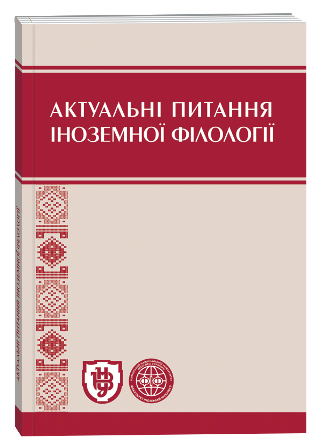TERMINOLOGY OF SUSTAINABLE DEVELOPMENT: ITS ORIGIN, SPECIFICS OF TERMS AND THEIR THEMATIC CLASSIFICATION
DOI:
https://doi.org/10.32782/2410-0927-2021-14-12Keywords:
term, terminology, sustainable (ecologically balanced) development, ecologization of human activities, semantics, lexical semantic, thematic classificationAbstract
Scientific knowledge and elaboration of the concept of sustainable development and its terminology needs to be deeply studied in spheres related to philosophy, jurisprudence or management as well as in linguistics. Implementation of sustainable knowledge in theoretical and applicable ways in terms of sustainable use of resources, responsible attitude toward environment, environmental safety, and innovative technologies requires comprehensive selection, analysis and linguistic description of new lexical items. Language is considered to be an important means of cognitive perception of the world, so the question arises how the sustainability paradigm is reflected by means of a language, in particular how it is conveyed by a word or term, and how new social processes manifest human concern for its future survival, and preservation of natural resources for future generations. The research is aimed at studying of the preconditions of sustainable development terminology, its origin and specifics of units as well as classification of major thematic groups. Linguistic study of the new stock of terms is an important issue in terms of investigation within environmental lexicon and will contribute to better understanding the meanings of the terms, their use and find out the proper Ukrainian equivalents. It will also assist towards the development of the information system support within the Ukrainian lexicographic field. Further investigation of structure of terms, semantic features and specifics of systemic relations will be done in the future studies. The research methods are descriptive in order to study the origins and the method of lexical semantic analysis used to determine the meanings and semantic features of terms and their thematic classification.
References
Бевзо Г. А. Джерела походження екологічної термінології в англійській та українській мовах : дис. ... канд. філол. наук за спец. 10.02.17. Львів : Львівський національний університет імені Івана Франка, 2018. 204 арк.
Гордун С. В. Терміносистема екомаркетингу: структурно-семантичні та функціональні параметри (на матеріалі англомовної публіцистики) : дис. ... канд. філол. наук за спец. 10.02.04. Запоріжжя : Запорізький національний університет, 2020. 295 арк.
Іващишин О. М. Англійські термінологічні словосполучення у текстах з проблем техногенного впливу на довкілля : дис. ... канд. філол. наук: 10.02.04. Львів : Львівський національний ун-т ім. Івана Франка, 2007. 263 арк.
Кобець Л. К. Лексико-семантична група як складник лексико-семантичної системи. Мова і культура. Вип. 15, том. 4. 2012. С. 129–135.
Миклаш Л. Т., Магура Б. О. Англо-український словник лісотехнічних термінів. Львів : Каменяр. 2013. 118 с.
Миклаш Л. Т. Структурно-семантичні параметри англомовної терміносистеми лісового господарства : дис. ... канд. філол. наук: 10.02.04. Київ : Київський ун-т імені Бориса Грінченка. 2018. 279 арк.
Саєвич І. Роль людського чинника у мові: людина – мова – світ. Українська мова і література в школах України. 2014. Вип. 7–8. С. 9–12.
Саламаха М. Я. Англомовна терміносистема охорони довкілля: структура, семантика, прагматика : дис. ... канд. філол. наук: 10.02.04. Львів : Львівський національний ун-т ім. Івана Франка. 2016. 317 арк.
Семенюк Е. П. Ідея Екологічної Конституції Землі як поглиблення концепції сталого розвитку. Науковий вісник УкрДЛТУ : Збірник наук.-техн. праць. Вип. 12.7. Львів, 2002. С. 29–35.
Туниця Ю. Ю. Екологічна Конституція Землі. Методологічні засади. Част. 2. За ред. акад. НАН України, д-ра екон. наук, проф. Ю. Ю. Туниці. Львів : РВВ НЛТУ України, 2011. 440 с.
Chorna I. I. Specific features of ecological terms. Проблеми та перспективи розвитку економіки і підприємництва та комп’ютерних технологій в Україні. Матеріали ХI всеукраїнської науково-практичної конференції (30 березня – 4 квітня 2015 р.). – Навчально-науковий Інститут підприємництва та перспективних технологій Національного університету “Львівська політехніка”. Львів : Видавництво Львівської політехніки, 2015. С. 263–265.
Du Pisani J. A. Sustainable development – historical roots of the concept. Environmental Sciences, June 2006; 3 (2): 83–96.
Agnoletti Mauro. Man, forestry, and forest landscapes. Trends and perspectives in the evolution of forestry and woodland history research. – Schweizerische Zeitschrift fur Forstwesen: 2006/9. Vol. 157, No. 9, P. 384–392. URL: http:// szf-jft.org/doi/abs/10.3188/szf.2006.0384
Report of the World Commission on Environment and Development: Our Common Future. URL: https://digitallibrary.un.org/record/139811
The Rio Declaration on Environment and Development (1992, Agenda 21). URL: https://sustainabledevelopment.un.org/outcomedocuments/agenda21
The Programme for the Further Implementation of Agenda 21, (1997) – “Ріо+5” New York. URL: https://www.un.org/ga/search/view_doc.asp?symbol=A/RES/S-19/2&Lang=E
The Johannesburg Declaration on Sustainable Development, the Plan of Implementation of the World Summit on Sustainable Development) (2002) “Ріо+10”. URL: https://www.un.org/esa/sustdev/documents/WSSD_POI_PD/English/POI_PD.htm
The future we want (2012) – Ріо+20. URL: https://sustainabledevelopment.un.org/content/documents/733FutureWeWant.pdf
The outcomes of the World Summit on Sustainable Development. URL: https://globalizationandhealth.biomedcentral.com/articles/10.1186/1744-8603-1-8
ВТССУМ – Великий тлумачний словник сучасної української мови.
САУС – Сучасний англо-український словник. Укл. Балла М. І. Київ : Освіта, 1996.
LDCE – The Longman Dictionary of Contemporary English.







